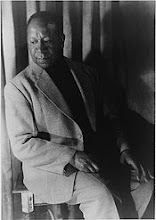Amy Elias, Director of the University of Tennessee Humanities Center and organizer of the groundbreaking UTK symposium "In a Speculative Light" on ShadowLight
Last week, I shared news about the world premiere of ShadowLight, the opera that brings Beauford's life story to the stage through song.
In that article, I indicated that Emily Anderson spent six months researching Beauford so that she could write a libretto that vividly portrayed his life.
Image courtesy of Marble City Opera
Today, I'm pleased to share Marble City Opera director Kathryn Frady's remarkable story about how she cast the production and baritone Brandon J. Gibson's sentiments about portraying Beauford. Gibson is also the managing director of Marble City Opera.
Image courtesy of Marble City Opera
To select the cast of ShadowLight, Kathryn Frady completely immersed herself in the music and the roles to be played during the performance:
"I held auditions in the Fall of 2019 after receiving the piano/vocal score from composer Larry Delinger. Larry had designated voice types for each of the roles, but before casting the singers I sang through each of the roles and studied the score so that I could understand what types of voices were needed.
"In opera, there are many different kinds of voices for each voice type. It is not as simple as casting any baritone, soprano, tenor, or bass. The texture of the music and which register the singer spends the majority of their time singing in, are majorly important.
"In my opinion the best way to understand how to cast a new opera is to sing through each role and study the score, so that is what I did. After studying the score I heard auditions and made selections from the singers who attended our audition days."
Frady believes that ShadowLight was well received for several reasons:
"I believe that the story and character of Beauford Delaney, a local to Knoxville, connected to the audience on a personal and emotional level that is unique to our community.
"I believe that the musical score that Larry Delinger created is beautiful, unique, and emotional.
"I believe it was also well received because of the cast's dedication to the interpretation of their characters given to them by the directors and all of the musicians' attention to detail led by maestro, Brian Holman.
on opening night
Image courtesy of Dawn Kunkel
"Add to that the beautiful projections designed by Joe Payne. The evening was well planned out and executed from all aspects."
on opening night
Image courtesy of Dawn Kunkel
The most important thing to Frady for any production is that it connects to the audience and moves them emotionally. She believes that in art, music, and theater, the audience should have a visceral reaction to what they have seen, heard, and experienced. She says that ShadowLight "brought all three of these things together and I believe moved the audience in attendance."
Brandon J. Gibson's portrayal of Beauford was profoundly moving for the audience.
Image courtesy of Marble City Opera
He first heard about Beauford about three years ago, following Marble City Opera’s first year of “Chocolate & Wine” concerts for Valentine's Day. Emily Anderson, the librettist, came to one of these performances and after hearing Gibson sing that night, she went up to him and said “I’ve found my Beauford!” She proceeded to tell Gibson about "this wild painter who also happened to be a short, round, and gregarious black man with a deep voice" that she was writing an opera about.
When Gibson looked Beauford up and realized just how local he was to the Knoxville community and how beautiful Beauford's work was, he became intrigued. As he learned about the life behind those works of art, he was even more intrigued and was "hooked from then on."
Gibson's mother died unexpectedly about a year and a half ago and he drew heavily from his experiences dealing with her passing as he portrayed Beauford's relationship with his mother, Delia.
"...it was not a stretch for me to sing about “missing her” as he [Beauford] often does in the opera. Once that vulnerability was established, the other barbs that he endured from the voices in his head were easy to react to in kind."
Image courtesy of Marble City Opera
I asked Gibson why he thought the opera was so well received. He replied:
"I think that the timing of the opera was perfect. From the exhibits, to the lectures and documentaries, etc., the city was primed to learn more about this man’s tragic story. The
combination of the material, and the visual elements really added a lot as well. The score, text, and direction all combined to tell a rich story."
The most important thing about ShadowLight for Gibson was that
"...in the end, Beauford triumphed. Despite, or perhaps in spite of his struggles, he was able to bring some beauty into the world. And to leave behind a legacy that serves as an inspiration to all of us. I feel honored to have played a small part in bringing his story to life!"
Image courtesy of Marble City Opera
Read additional reviews of ShadowLight here:
Marble City Opera’s 'Shadowlight' is another success
Opera airs anguish and artistry of Beauford Delaney
Read articles that describe Beauford's emergence into the minds and hearts of the people in Knoxville and East Tennessee here:
Artist of Color
Beaufort Delaney Acclaimed From Paris to Knoxville










No comments:
Post a Comment